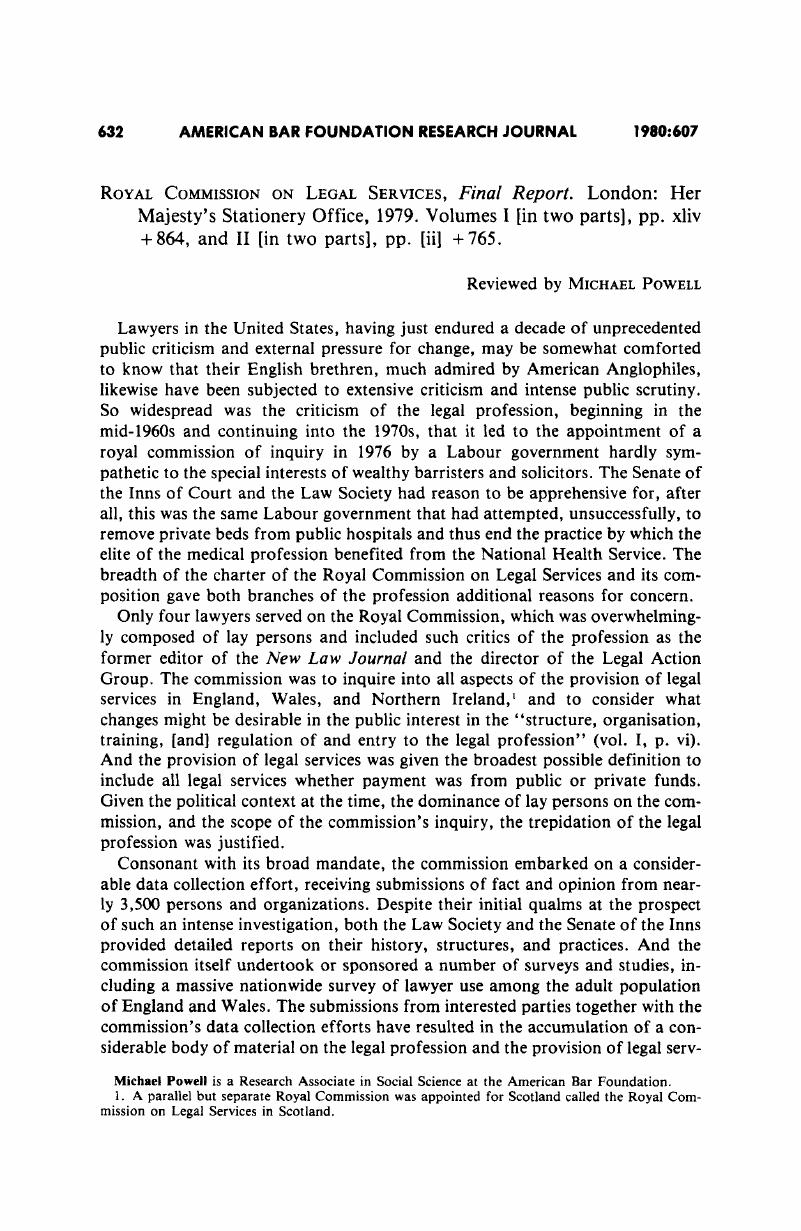No CrossRef data available.
Published online by Cambridge University Press: 27 December 2018

1. A parallel but separate Royal Commission was appointed for Scotland called the Royal Commission on Legal Services in Scotland.Google Scholar
2. Chief Justice Burger's comments to the Royal Commission about the poor quality of advocacy in American courts were reported in the American media and provoked substantial controversy within the legal profession. N.Y. Times, Dec. 1, 1977, at B9. See also the interview with Chief Justice Burger in U.S. News & World Rep., Dec. 19, 1977, at 21–24; 64 A.B.A.J. 7 (1978).Google Scholar
3. The Monopolies Commission, established under the terms of the Monopolies and Mergers Act of 1965, was asked by the Board of Trade in 1967 to investigate the restrictive practices of the professions. The terms of reference of the Monopolies Commission investigation are set out in appendix A of Michael Zander, Lawyers and the Public Interest 333–35 (London: Weidenfeld & Nicolson, 1968). Subsequently, the Monopolies Commission recommended a general relaxation of the ban on professional advertising in 1970, followed by more specific criticism of the Law Society's continued ban on individual practitioner advertising in its 1976 report. See the Final Report, vol. 1, pp. 368–69.Google Scholar
4. Duty solicitor schemes are arrangements whereby solicitors in private practice are organized into rosters by their local law societies to ensure that all arrestees brought before the magistrates’ courts on criminal charges receive pretrial counsel. The first such schemes were initiated in Bristol and Cardiff in 1972 by the local law societies. The Royal Commission noted that through the schemes solicitors “provide pre-trial advice to defendents who are often confused or ignorant …, encourage the adequate preparation of bail applications and help reduce the number of ill-advised pleas, whether of guilt or innocence, and the number of remands required” (vol. I, p. 93).Google Scholar
Convinced of their value, the Royal Commission advocates their improvement and extension. It recommends 24-hour rosters and duty solicitor schemes operating in prisons in addition to the coverage of all magistrates’ courts (vol. I, pp. 96–99).
5. For a discussion of the treatment of the Judicare model for the provision of legal services to the poor, see Samuel J. Brakel, Prospects of Private Bar Involvement in Legal Services, 66 A.B.A.J. 726–28 (1980). In an earlier work Brakel discusses the results of some early experiments with Judicare, almost always established in rural parts of the country. Samuel J. Brakel, Judicare: Public Funds, Private Lawyers, and Poor People (Chicago: American Bar Foundation, 1974).Google Scholar
6. Barbara A Curran, The Legal Needs of the Public: The Final Report of a National Survey (Chicago: American Bar Foundation, 1977).Google Scholar
7. Id. at 185.Google Scholar
8. Id. at 190.Google Scholar
9. Id. at 188–90.Google Scholar
10. Id. at 187.Google Scholar
11. Id. at 196.Google Scholar
12. Id. at 214.Google Scholar